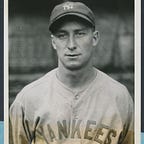Wednesday, June 8, 1927: New York City
A Walk Through Central Park. A Shoe Shine. And The Man Who Fixed The World Series.
 Between April 12 and October 1, we play 154 games in 173 days.
Between April 12 and October 1, we play 154 games in 173 days.
At least half a dozen of our off days are spent playing even more games, exhibitions around the country against a variety of semi-pro clubs. We play most of them during our trips out West. While traveling in between games in Chicago, St. Louis, Cleveland and Detroit, we take detours to cities like Indianapolis, St. Paul, and even Ottawa, Canada. The exhibition games make money for the team and for the Babe — Ruth gets a cut of the gate — and they go a long way towards making the Yankees the team all of America roots for.
Another half dozen of our off days are spent on trains, rolling from stadium to stadium. That leaves us with only nine scheduled days off over six months, and odds are that half of those will be eaten up by make-up games because of rainouts.
In the end — after exhibitions, travel days, rainouts and make-up games — over six months we’ll get six days off, if we’re lucky.
Yup, it’s a long season.
Monday was one of those few days off, so I slept till nine. I awoke to find a note on my night table from Steven, asking me to meet him for lunch down at his Wall Street office at 12:30. His invite ended:
“Wear the blue suit and silver tie. And get your shoes shined at the stand outside of Trinity Church.”
I looked up to find my closet door open and a blue suit and silver tie — neither of which I had ever seen before — hanging from my door.
It’s a perfect spring day, so I decide to walk across Central Park and take the Lexington Avenue IRT down to Wall Street. I walk along the south side of the boat pond and around Bethesda fountain. At 10:30 in the morning there are just two boats out on the water. An old man is fishing from one. Floating a short distance behind him, a young woman with a parasol is being serenaded by a middle-aged man with a wonderful voice and, most likely, a wife who is out of town.
I walk past the new bandshell and down to the Central Park Menagerie, where there is the usual crowd of kids, parents and passersby around the elephant field. Jewel is out and getting a wash-down.
“Johnny!” I shout to Jewel’s keeper as I walk by. Johnny Coyle gives me a wave as he scrubs the giant, 96-year-old pachyderm.
As always, atop Johnny’s head is a Yankees hat. A couple of years ago, the Babe was posing for newspaper photos at the Menagerie with Mayor Walker and a pack of orphans, to raise money for the Children’s Aid Society. Just before the flashbulbs went off, the Babe tried to put a Yankees cap on Johnny for the picture, but Johnny wouldn’t wear it, explaining that he was worried about losing his job for being photographed not wearing his Menagerie uniform hat. The Babe’s response was to ask, “Who’s the head cheese around here?” Then he and the parks commissioner — who for the first time in weeks had left his work station at the pub across the street from City Hall to be part of the festivities — had a brief chat. Since that day, Johnny Coyle is the only New York City employee to have a Yankees cap as part of his official uniform.
Living next to Central Park, I’ve gotten to know Johnny. He’s a good egg. A couple of times now, he’s given Benny, Steven, Stanwyck and me private tours of the zoo at sunrise, letting us wash Jewel and even throw meat into the lion and tiger cages. The funny thing is, up until that day when he posed with the Babe for the newspapers, Johnny, who grew up a block away from the Polo Grounds in the 1890s, had been a Giants fan.
 Wall Street is a world away from Central Park and the Menagerie, especially when you take the IRT Subway between them. The IRT stop lets you out at the corner of Wall Street and Broadway, right in front of Trinity Church, which is where Wall Street begins. I doubt anyone who actually matters on Wall Street has ever been inside the church, but it’s a nice starting point for a street where the dollar is the almighty, and where men spend their days reading ticker tape machines and betting on the price of pork bellies, all the while believing that they’re doing God’s work.
Wall Street is a world away from Central Park and the Menagerie, especially when you take the IRT Subway between them. The IRT stop lets you out at the corner of Wall Street and Broadway, right in front of Trinity Church, which is where Wall Street begins. I doubt anyone who actually matters on Wall Street has ever been inside the church, but it’s a nice starting point for a street where the dollar is the almighty, and where men spend their days reading ticker tape machines and betting on the price of pork bellies, all the while believing that they’re doing God’s work.
In front of the church there’s a double-seated shoe shine platform. I sit down for a shine next to a pinstriped suit with his head buried behind the Wall Street Journal. He’s getting his shoes shined by a boy who might be 14, if that.
“Oh, my! Deez-a shoes need a lot of work!” says an older shoe shine who looks just shy of forty.
“I know,” I tell him as he starts working on my shoes.
“It look like you was-a working da’ potato fields!”
“You tell him Salvatore,” says the collection of pinstripes behind the The Journal. “Why don’t you use some of your special shine on him. It’ll be my treat.” Salvatore opens a drawer under my seat and takes out a bottle of liquid cream, which he pours onto his brush, and then scrubs into my shoes. Then he grabs a rag and massages the leather, as if he were Doc Woods working on Pennock’s arm.
“See how hard these guys work,” says the Wall Street Journal man. “You get to play ball all day in front of thousands of people. I feel like I work hard, and God knows I make a lot of money, but we don’t work like Salvatore and his son over here, do we? You work pretty hard here, Salvatore, isn’t that right?”
Without looking, up the shoe shine man says, “That’s-a right, Mr. Thornberry.”
“And not only does Salvatore’s family work harder than we do, they’re also more inventive. You’re an inventive guy, aren’t you Salvatore?”
“That’s-a right, Mr. Thornberry.”
“Salvatore here invented this miracle lotion that’s about to make your shoes look better than new, didn’t you Salvatore?”
“That’s-a right, Mr. Thornberry.”
A second bottle of the miracle shine suddenly flies up into the air from behind the Wall Street Journal. I reach up and catch it just before it hits Salvatore in the head.
“Mr. Thornberry,” I say with a bit of a scold, “you’ve got a weaker arm than Earle Combs, and your aim is as bad as Koenig’s. Oh, by the way, thanks for the suit and tie.”
Steven puts down his newspaper. “You’re welcome. Now take a look at your shoes.”
Salvatore is buffing them with the power of a locomotive engine, dragging the cloth back and forth with such speed that I’m actually getting a hot foot from the friction. Every couple of seconds he stops, snaps the cloth, then slaps it back down on my foot and warms it up again. My shoes actually look better than new. Honest.
“Wow.” I look at the label which says, “American Shoe Cream.” It has a picture of a black shoe with the rays of the sun shooting out from it, all framed by small American flags.
“What is this stuff?”
“Immigrant magic, Tommy. Immigrant magic.”
 Steven pays Salvatore about five times more than the cost of a normal shine. We then hop into his car, which he’s parked right in front of the shoe shine stand and a fire plug, and drive the three blocks to his office in the A.G. Becker building on Pine Street, right around the corner from Federal Hall on Wall Street and Broad. Again, Steven leaves his car in front of a fire plug.
Steven pays Salvatore about five times more than the cost of a normal shine. We then hop into his car, which he’s parked right in front of the shoe shine stand and a fire plug, and drive the three blocks to his office in the A.G. Becker building on Pine Street, right around the corner from Federal Hall on Wall Street and Broad. Again, Steven leaves his car in front of a fire plug.
“You’re not worried about getting a ticket?”
“It’s all part of the magic of working with Rothstein.” He points to a card on his windshield that says, “City Hall Permit. 1927.,” and then bounds into the building. Steven’s offices are on the fifth and sixth floors. The busiest part of his office — the “boiler room,” which is packed full of rows of young men behind desks making phone calls to sell stocks and bonds — is on five. On six, about a quarter of the floor is an apartment with a bedroom, a full bathroom, a kitchen and a bar, which explains how Steven can stay up all night and still be at work at 8:00 a.m.
“These immigrants have an energy about them, Tommy!” Steven says flushed with excitement as he pours a scotch for each of us. “They’ve got an energy and an inventiveness that is untapped. And I’m going to tap it. This great country of ours is now full of foreigners chasing the dream of becoming the next Henry Ford, or more likely the next Pol*ck-K*ke who invents Q-Tips. And I’m going to help them do it.”
“When did you start waving the flag?” I ask him. “At Penn State you spent half your time trying to get coeds and the other half trying to figure out how to get out of the draft — you only volunteered once Rothstein got you a job in the selective service office in Manhattan.”
“Well,” Steven begins, “now that little Jew has done it again. We’ve just formed 20th Century American Investments. That’s what we were talking about when you came upon our meeting during your scavenger hunt at Harry Frazee’s estate.”
Steven brings me over to a table with a pile of newspapers on it. Most of them are ethnic papers — the Irish Echo, the Jewish Daily Forward, and a bunch of newspapers written in Italian, German and even Chinese. He opens up one of the papers and shows me an advertisement, printed against a background of the American flag. It screams:
“I’m running these advertisements in close to fifty papers in New York, Boston, Philadelphia and Chicago.”
I go through the pile of newspapers. In all of them the advertisements are posted twice, on opposite pages, once in English and once in the native language of the readers. I’m wondering how Steven can be so sure that the Chinese advertisement actually says what he thinks it does. I also wonder out loud, “Do you really think there are that many good ideas out there?”
“They only have to be good enough for us to sell stock in them. For Chrissakes, Tommy, in ’20 when I first started working on the Curb Exchange it was just a mob on a street corner — the exchange didn’t even have a building! — and I sold complete crap there. Hell, I sold shares of stock in a dog. A dog, for Chrissakes.”
He did. Not a dog of a company, but a real live dog. And a mutt, at that. He did it on a bet. You’d think a guy would be arrested for that, selling stock in a dog. Instead, word got around, and next thing Steven knew he was working indoors with Arnold Rothstein and Charles Stoneham, the owner of the New York Giants, running a bucket shop for them and making millions of dollars a year.
“So, you think people will buy anything?”
“Tommy, people will buy anything — and they’ll try to sell anything, too. That’s not just the American way, that’s the world over.”
“So, now you’re selling… what?”
“I’m selling hope,” he says while lighting up a cigarette and then tossing his gold cigarette case and gold lighter my way. “I’m selling America. I’m selling penny stock in hope and in this great country of ours. The greatest country in the world! A country that’s finally, thank God, shut the door on the last wave of Guine*s, Pol*cks, Russk*es, Kra*ts, K*kes, and Ch*nks — all of them wanting nothing more than to be Americans. And why not? We’re the greatest country in the world, right? And we fought the Great War to prove it.”
“I don’t know what that war proved,” I say, laying down on his couch and tossing the case and lighter back. “Are you really going to make whatever crazy inventions you get back in the mail from these advertisements?”
“Me? No?”
“Will anyone?”
“I doubt it. But a lot of people will buy stock in just the ideas, especially once the boys downstairs get on the phones and start selling it — whatever the ideas are. The actual idea isn’t the point.
“And we’ll be advertising those stocks in those same papers, so plenty of Luigis, Fritzes, Hymies and even a few Wongs might be buying their first securities since they bought Uncle Sam’s war bonds.
Buying war bonds is how most of America got hooked on stocks in the first place. They were hooked by a nasty combination of patriotism and Wall Street — and guys like Steven have been reeling them in, over and over, ever since.
“The big thing is Rothstein and Stoneham are putting up the money, and Rothstein and his tribe are supplying the legal team, so we’ll quickly get patents pending on whatever ideas sound good. Then we’ll incorporate them and sell the securities. Can you imagine how Salvatore and his son are going to feel when their kitchen-cooked shoe polish gets turned into a real company and put on stock certificates? Hey, do you think the Babe would want to invest in this?”
I instantly feel like I’ve been hit in the head by a batted ball while standing in the on deck circle.
“Ruth invest in one of your immigrant ideas? Like Salvatore’s great American shoe polish? Sorry, but you’re about five years too late for that nonsense. Before Christy Walsh, Ruth would have opened up his wallet to you, even if you tried to sell him American Shoe Polish & Hair Cream combined in a single bottle! But now that Walsh is managing Ruth’s money, sorry again, pal, but those days are gone.”
“I’m not looking for him to buy the shoe polish stock! Jesus, Tommy, please. I’m talking about putting money into the company, into 20th Century American Investments. We’re going to make a killing. John McGraw’s putting in ten thousand.”
“Are you kidding me! Are you actually asking me if Babe Ruth might want to invest in a company run by the man who fixed the 1919 World Series? Have you lost your mind?”
“Allegedly, Tommy. Allegedly.”
“Rothstein allegedly fixed the series the way the sun will allegedly set tonight and then allegedly rise tomorrow morning. I don’t know how Commissioner Landis lets Stoneham and McGraw get away with owning that gambling hall in Chelsea with Rothstein, but there’s no way anyone else in baseball is going to go near this alleged company of yours.”
Steven stubs out his cigarette.
“Well, Rothstein wants to meet you. Let’s go to lunch.”
As we head out the door, I’m thinking to myself, “Good thing I’m wearing a new suit and tie.”
 For lunch, Rothstein has made arrangements for us to dine in a private room on the second floor of Delmonico’s, a restaurant on South William street, just a block from the Harbor. It’s only five blocks from Steven’s building, so of course we take his car — which he parks by the restaurant’s front door, right in front of a fire plug.
For lunch, Rothstein has made arrangements for us to dine in a private room on the second floor of Delmonico’s, a restaurant on South William street, just a block from the Harbor. It’s only five blocks from Steven’s building, so of course we take his car — which he parks by the restaurant’s front door, right in front of a fire plug.
Rothstein arrives late, and says he will have to leave early. I get the feeling Steven has gotten word to him that I won’t be moonlighting as his stockbroker in the Yankee locker room, which may explain why Rothstein joins us only for dessert.
“You pitched a wonderful game on Sunday,” he says while cutting into a slice of cheesecake that arrives at our table no more than ten seconds after Rothstein sits down.
“Were you at the stadium?” I ask him.
“Me? No. Occasionally I go to the Polo Grounds with Charlie Stoneham, but other than that I don’t go to many baseball games these days. But I still follow both leagues in the newspapers. Like everyone else, I enjoy reading about Ruth. Mostly because it tells me a lot about Huggins — the way he handled Ruth in ’25, suspending him until he cried ‘Uncle,’ and insisting Ruth apologize in front of the whole team — he’s a tough little man. I’m impressed by how he gets all the talent on your team to play together. It can’t be easy. Huggins is a thinking man’s manager — unlike McGraw, a bully whose time has passed and is no longer the right man for the modern athlete.”
Rothstein is impressed by Huggins, and I’m impressed by the way Rothstein thinks.
“Also, Huggins is a smart investor. I know he had a lot of land in Florida, and he sold it just before the crash in ’25. What’s he telling you boys about the market these days?”
I’m not sure how Rothstein knows all of this but Huggins is, indeed, a master investor who has made a small fortune. He regularly gives the players and coaches financial advice about stocks and bonds and real estate — some players have even given him portions of their salary to invest on their behalf. He cautions and instructs us about the difference between smart and dumb investments, and sometimes he even gives us a scolding, or worse.
Last year Huggins heard a rumor that Gehrig spent $6,000, almost his whole season’s salary, on a new car. Doc Woods says the morning after Huggins heard about Gehrig and the car, Doc came into the locker room at eight in the morning and Huggins was pacing in his office, furious at the thought that Lou had blown his money, and he was blaming it on Ruth. He was shouting, “Goddamnit, Doc! Lou actually looks up to that giant infant! I’m going to kill them both!”
A little later, Lou walks into the locker room — the first player in, as usual — and he knocks on the manager’s office door. Lou is still in street clothes and he’s holding a note that Hugg had left on his locker. He politely says, “You wanted to see me, Mr. Huggins?” And Hugg comes flying across the room — he’s so blind-angry that he actually takes a swing at Lou, right at his kisser. A full swing! He’s completely frothing at the mouth, and he’s screaming, “I’ve been trying to teach you boys some financial sense and you go out and spend a year’s pay on a car!”
As Doc tells the story, Lou’s holding out his hands, he’s still holding onto the note and he’s trying to keep this little mad dog — who comes up to Lou’s shoulders — at bay, without fighting back and hurting him. Lou says, “Mr. Huggins, I bought a used car! I bought a used Packard for $700!” And Hugg backs up and just stares at him. Then Hugg stammers, “Well, ah, um, well, then let that punch be a lesson to ya’. Now get out of here!”
Doc told me, “I watched Lou leave Hugg’s office shaking his head, and I turn back and see Hugg is cryin’ tears. And he looks up at me and says, ‘Doc, I love that big kid.’”
I don’t tell Rothstein any of this. I just answer his question. “These days Mr. Huggins is telling the guys to be cautious. Not to be getting too carried away, and not to put all of our money into the market. He keeps telling us to diversify.”
“How many of your teammates can pronounce that word?”
“All of them.”
“Even the W*p, Lazzeri?”
“That W*p may already be the smartest player in the league.” But Rothstein’s right, so I add, “even if he doesn’t use that exact word.”
“Of course. Of course. And how’s Dugan’s leg?”
“Always bothering him, but he’ll be fine.”
“Good. Good to hear,” Rothstein says, finishing off his cheesecake and wiping his lips. “Good to meet you, Myles. Your friend Steven has impressive things to say about you.”
He nods to Steven, stands up, and walks away from the table.
“And that,” says Steven, “is how Arnold Rothstein says goodbye.”
- LOU Gehrig
- Leo Gerstenzang (Inventor of Q-tips)
- MILLER Huggins
- John McGraw
- Arnold ROTHSTEIN
- STEVEN
- Charles Stoneham
- Christy Walsh
- 1927 Yankees
- 1919 World Series
- Bucket Shops on Broadway
- NEW YORK TIMES, July 21, 1928: “Last Elephant in Central Park Zoo Dead; Bullets End Paralyzed Beast’s 97 Years”
- NEW YORK TIMES, September 30, 2010: “When Stocks Came in From the Cold” (Curb Exchange)
- June 5, 1927: “Ruth’s Two Blows Upset Tigers, 5–3”. New York Times and Box Score.
“Henry Ford Blames the Jews. (And I Get a Win.)”
The Yankees are playing the White Sox, a team that still cannot escape the spectre of their 1919 World Series, including the Yankees’ own Dutch Ruether, who served as a starting pitcher on the Reds, the Black Sox’s opponent. Everyone had an opinion about the scandal, including Henry Ford, who singled out the entire Jewish people as responsible for the debacle. Myles doesn’t agree with this assessment, but will take any chance he can to pitch against the “Black Sox,” even eight years after the fact.
It’s not easy for anyone to be clean in Chicago. And back in 1919, it was easy for a ballplayer to be dirty.
No one — with the exception of our own Dutch Ruether, and possibly his mother — believes that game was played on the level. But good old Dutch believes he won that game legit. It’s insane.
